Eye health is not related to the quality of your vision. Even if you suffer from astigmatism or are near- or far-sighted, you can still have healthy eyes. It is important to wear prescription safety glasses or other corrective eyewear to improve your vision, if necessary. A number of chronic illnesses that undermine the health of the eyes can be prevented by eating a balanced diet and getting regular exercise. Find out about five ways to keep your eyes healthy for a lifetime and minimize the risk of eye injury or the progressive effects of untreated eye conditions.
Eye health is not related to the quality of your vision. Even if you suffer from astigmatism or are near- or far-sighted, you can still have healthy eyes. It is important to wear prescription safety glasses or other corrective eyewear to improve your vision, if necessary. A number of chronic illnesses that undermine the health of the eyes can be prevented by eating a balanced diet and getting regular exercise. Find out about five ways to keep your eyes healthy for a lifetime and minimize the risk of eye injury or the progressive effects of untreated eye conditions.
1. Make Sure You Can See Clearly
You should be able to see clearly with glasses or other vision aids at any age. Get a vision exam to determine whether you need to wear prescription eyewear. Maintaining a current prescription is essential for eye health over the course of a lifetime. Get regular eye exams at the frequency recommended by your optometrist or ophthalmologist.
As we age, our eyesight often starts to degrade. After age forty, the age-related condition presbyopia may diminish your ability to see things that are up close clearly. You may notice that you hold reading materials further away from your eyes to be able to focus. Reading glasses can provide a solution to this vision issue. Go to an optometrist or ophthalmologist to get glasses prescribed that will restore your vision and promote eye health.
2. Eat a Balanced Diet
The condition of your eyes is related to your overall health. A diet rich in whole food sources of vitamins, minerals, omega fatty acids and proteins is good for vision support. Beans, eggs, fish, nuts and edible seeds provide the nutrients that are the most necessary for ocular well-being.
Eating five servings of fruits and vegetables a day, particularly yellow and green leafy vegetables, carrots, oranges and other citrus fruit provide the building blocks for maintaining eye health. Ask your general practitioner about supplementing your diet with lutein or zinc, which may help to lower your risk of developing cataracts or macular degeneration.
3. Exercise for Overall Health
Exercise improves comprehensive physical health, including the health of your eyes. Physical activity may help to prevent or manage the symptoms of health conditions such as diabetes, high blood pressure and high cholesterol, all of which can negatively impact vision.
Caring for your body should include your eyes. Wear prescription glasses during physical activity to see clearly and consider sporting safety glasses with shatter-resistant prescription lenses during sports or workouts that pose any risk of eye injury.
4. Wear Eye Protection
Sports eye protection can prevent some of the most common causes of eye injury for children, teenagers and adults. Check the ASTM International eye protection standard for any activity to select glasses or goggles that provide a suitable level of impact protection.
Eyewear that meet the American National Standards Institute Z87.1 standard may provide basic impact or high-impact eye protection. The lenses of impact-rated prescription safety glasses are marked with Z87-2+ on the right side of lenses and the sidearm of frames.
5. Know Your Family History
Many optical conditions are genetic. If your parents or other relatives have developed cataracts or experienced macular degeneration as they aged, you may be more likely to experience these conditions. Most people experience some degree of presbyopia after the age of forty.
Keeping your eyes healthy is worthwhile regardless of the power of the lenses in your prescription glasses or any eye conditions that run in your family tree. Getting the nutrients you need, staying in good shape and protecting your eyes from injuries can help you maintain sight for a lifetime.





